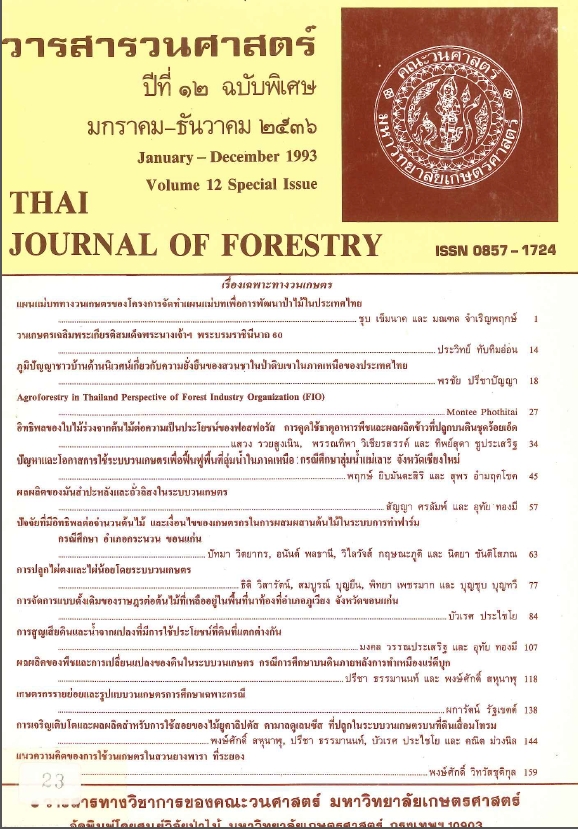ปัญหาและโอกาสการใช้ระบบวนเกษตร เพื่อฟื้นฟูพื้นที่ลุ่มน้ำในภาคเหนือ : กรณีศึกษาลุ่มน้ำแม่เลาะ จังหวัดเชียงใหม่
Main Article Content
บทคัดย่อ
รายงานนี้เป็นการเสนอผลการวิเคราะห์เกี่ยวกับปัญหา และโอกาสที่จะนำเอาระบบวนเกษตรเพื่อฟื้นฟูการใช้ประโยชน์ที่ดินแบบยั่งยืนในลุ่มน้ำภาคเหนือ โดยศึกษาในพื้นที่ลุ่มน้ำแม่เลาะ อำเภอแม่ริม จังหวัดเชียงใหม่ การวิเคราะห์เน้นที่ระดับครัวเรือน และชุมชนของ 4 หมู่บ้านในพื้นที่ลุ่มน้ำ ปัญหาร่วมกันที่เกี่ยวกับข้อจำกัดของการนำรูปแบบวนเกษตรไปปรับใช้ในพื้นที่ ได้แก่ เกษตรกรแยกส่วนการใช้ประโยชน์ที่ดินเพื่อการเกษตรและป่าไม้ และไม่มั่นใจในสิทธิการได้รับประโยชน์และผลตอบแทนทางเศรษฐกิจจากการปลูกไม้ป่าในพื้นที่เกษตร นอกจากนี้เกษตรกรไม่สามารถแจงชนิดของป่าไม้ที่จะปลูกร่วมกับพืชเกษตรได้อย่างเหมาะสม ความจำเป็นพื้นฐานในเรื่องอาหารและรายได้ที่มั่นคงเป็นเป้าหมายหลัก ซึ่งเกษตรกรสามารถเสาะหาได้ด้วยการปลูกพืชเกษตรเสริมด้วยการเก็บเกี่ยวผลิตผลจากป่าชุมชนและป่าอนุรักษ์ และการรับจ้างเกษตรกรให้ความสำคัญต่อสิทธิการใช้ที่ดินอย่างถาวรมากกว่าการมีกรรมสิทธิ์ในที่ดิน และได้เริ่มยอมรับรวมทั้งขยายการปฏิบัติระบบการปลูกพืชระหว่างแถบไม้พุ่ม (กระถิน แคฝรั่ง และถั่วมะแฮะ) ตามแนว ระดับเพื่ออนุรักษ์และฟื้นฟูความอุดมสมบูรณ์ของดิน วิกฤตการณ์ขาดแคลนข้าวบริโภค เนื่องจากการระบาดและทำลายของโรคไหม้คอรวงข้าวในฤดูปลูกปี 2535 ได้ทำให้เกษตรกรต้องดิ้นรนหาทางเลือกด้านการเกษตรมากยิ่งขึ้น ปัญหาเรื่องอาหารและเศรษฐกิจของครัวเรือนจะมีผลกระทบต่อแรงจูงใจในการทำกิจกรรมฟื้นฟูสภาพป่าของชุมชน ทางเลือกการใช้ประโยชน์ที่ดินในพื้นที่สวนป่าเพื่อปลูกพืชไร่เศรษฐกิจถูกจำกัดด้วยเงื่อนไขวิธีการเตรียมพื้นที่ อย่างไรก็ตามเกษตรกรให้ความสนใจกับการนำพืชอาหารสัตว์ปลูกร่วมในสวนป่า ซึ่งจะสอดคล้องกับความนิยมการเลี้ยงสัตว์ของชุมชนที่จะยกระดับรายได้ของครัวเรือนอีกทางเลือกหนึ่ง
Downloads
Article Details

อนุญาตภายใต้เงื่อนไข Creative Commons Attribution-NonCommercial-NoDerivatives 4.0 International License.
ข้าพเจ้าและผู้เขียนร่วม (ถ้ามี) ขอรับรองว่า ต้นฉบับที่เสนอมานี้ยังไม่เคยได้รับการตีพิมพ์และไม่ได้อยู่ในระหว่างกระบวนการพิจารณาตีพิมพ์ลงในวารสารหรือสิ่งตีพิมพ์อื่นใด ข้าพเจ้าและผู้เขียนร่วม (ถ้ามี) ยอมรับหลักเกณฑ์และเงื่อนไขการพิจารณาต้นฉบับ ทั้งยินยอมให้กองบรรณาธิการมีสิทธิ์พิจารณาและตรวจแก้ต้นฉบับได้ตามที่เห็นสมควร พร้อมนี้ขอมอบลิขสิทธิ์ผลงานที่ได้รับการตีพิมพ์ให้แก่วารสารวนศาสตร์ คณะวนศาสตร์ มหาวิทยาลัยเกษตรศาสตร์ กรณีมีการฟ้องร้องเรื่องการละเมิดลิขสิทธิ์เกี่ยวกับภาพ กราฟ ข้อความส่วนใดส่วนหนึ่ง หรือ ข้อคิดเห็นที่ปรากฏในผลงาน ให้เป็นความรับผิดชอบของข้าพเจ้าและผู้เขียนร่วม (ถ้ามี) แต่เพียงฝ่ายเดียว และหากข้าพเจ้าและผู้เขียนร่วม (ถ้ามี) ประสงค์ถอนบทความในระหว่างกระบวนการพิจารณาของทางวารสาร ข้าพเจ้าและผู้เขียนร่วม (ถ้ามี) ยินดีรับผิดชอบค่าใช้จ่ายทั้งหมดที่เกิดขึ้นในกระบวนการพิจารณาบทความนั้น”


